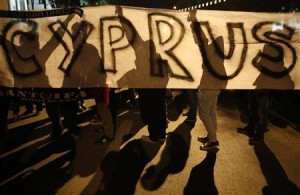After news crews outnumbered customers in some ATM lines last week when banks in Cyprus opened back up following a bailout deal with European Union officials, the mainstream financial media appears to have quickly lost interest in this story.
They shouldn’t.
This continues to be one of the more important developments in the long-running global financial crisis and it’s likely to spur a good deal of new interest in gold (GLD). Not immediately, but, over time, there is sure to be a “slow motion bank run” by wealthy investors in many parts of the world and some portion of that money will be used to buy gold.
It’s no surprise that there was little commotion when banks in Cyprus reopened last Thursday. Why? Because insured accounts (less than 100,000 euros) were left untouched in the bailout deal and capital controls limited cash withdrawals to 300 euros for individuals and to 5,000 euros for businesses. Large accounts, where up to 60 percent of deposits could be seized, were frozen.
In order to have a run on any bank, depositors must be able to withdraw their money – all of it if they desire – and that simply hasn’t been possible in recent days.
Word came on Monday that 37.5 percent of deposits exceeding 100,000 euros have already been seized to recapitalize the Bank of Cyprus, the nation’s biggest lender, with another 22.5 percent to remain blocked until the recapitalization plan is finalized. The 40 percent of large accounts that is left over could be unfrozen as soon as today, but even this won’t result in a bank run due to capital controls.
For example, if a Russian businessman had a million euros in his Cyprus bank account and is now told that he has 400,000 euros left, it would still take him over three months to empty his account at a rate of 5,000 euros a day. There are exceptions (e.g., for a company to meet its payroll), but, current rules require that any transfers over 5,000 euros a day must be approved by the central bank.
Of course, this precedent doesn’t bode well for countries like Spain and Italy where, with the first sign of new sovereign debt troubles, there could be a major run on banks by large depositors who fear they too might be “Cyprused” (a new verb that has just entered the lexicon).
Ironically, the most recent bailout could make future bailouts more likely, but that’s a story for another day. Large depositors are few in number in Cyprus, but they account for more than half of all bank deposits and it’s much the same elsewhere in the world. Importantly, after what happened on this tiny Mediterranean island, these large depositors will never look at banks in the same way.
Large bank deposits were never insured, but there was always an implied level of trust with these bank counterparties and that brings us back to gold. In an unstable financial world that really hasn’t recovered from the 2008 financial crisis, trust in banks and counterparty risk are now suddenly being called into question again.
If I were a wealthy investor in Europe with a lot of uninsured money held at a bank (particularly in countries like Italy and Spain), I’d certainly be asking questions. I’d also be inquiring about the nearest gold bullion depository.
European Union officials have telegraphed to large uninsured depositors that their accounts are no longer safe and these depositors are not likely to sit idly by, hoping that what happened in Cyprus doesn’t happen to them.
They won’t all withdraw their money immediately, but a good portion of this money will leave the banking system in what can be described as a “slow motion bank run.” These wealthy depositors didn’t get to be wealthy by being stupid.
Where the money will go is anyone’s guess and I’d guess that U.S. stocks and bonds will be one popular destination since we’re the “best looking horse in the glue factory” at the moment.
Some of this money will also go into gold bullion and for a very good reason – counterparty risk.
Aside from the company that is storing your bullion, there is no counterparty risk with gold and if you store the metal yourself, then you’ve got no counterparty risk at all. No one is going to waltz in one day and tell you that they appreciate your business but, unfortunately, you’ve just lost about 40 percent of your money and they’re going to hold on to another 20 percent in case they need it later.
What happened in Cyprus was a real game changer for wealthy individuals with large bank deposits and more of them will turn to gold simply because they no longer trust the banks.










